
The War In Rhodesia
The first full, unrestricted photographic coverage of the fighting that's going on a few hundred kilometres from Johannesburg.
THE WAR OF NERVES, PROPAGANDA AND RUMOURS
Russian Tanks Trundling Down Salisbury's Jameson Avenue
By A.J. Venter
Supplement to SCOPE June 25, 1976
Security Force patrol members lie in ambush along one of the many paths that criss-cross the north-east region.
ALMOST a year has elapsed since SCOPE published two exclusive supplements on the Rhodesian war. Then, hostilities were restricted mainly to the area between Mount Darwin and the Zambesi Valley with sporadic activity farther west.
Six months ago a second front was opened, which can be divided into two broad regions. One is the eastern zone stretching from Nyamapanda (the Mozambican border post leading to Tete) to Umtali and including the Inyanga and Vumba mountain regions.
The second area of hostilities stretches from the city of Umtali south to the South African border. This region includes the tea, coffee and sugar estates around Chipinga, the giant Hippo Valley sugar plantations, the Gona-Re-Zhou National Park, the Nuanetsi farming district and a fairly large tract of territory stretching inland towards the main rail and road links with South Africa just north of Beit Bridge.
One independent estimate has put the area in dispute between security forces and insurgents as about the size of Natal, running in a long swathe from the Zambesi to the Limpopo. It is thought that there are more than 500 terrorists active in the east and south-east.
Conditions within the war zones are serious. Recent developments include a terrorist contact in the hills overlooking Umtali. A group of four or five insurgents were spotted in May by a security force patrol and chased across the Mozambique frontier.
Pump houses in the Hippo Valley Estates have been mortared, a bank was blown up south of Inyanga and a variety of government, civilian, and military targets rocketed. These attacks are over and above daily onslaughts on farm homesteads and what is probably the most concerted land mining campaign yet launched in Africa.
On average, two civilian and military vehicles are lost to mines each day although recent security force measures have resulted in large quantities of landmines being lifted in daily clearing operations which span all major un-tarred routes in the operational area. All roads are now classified red, amber or white, according to the level of terrorist activities.
There have been other changes. Terrorists are now adopting some of the measures employed by the Vietcong in Vietnam.
One of these includes the use of poison spikes and a variety of booby traps, all intended to maim or kill the pursuer, but which, more often than not, result in injury to civilian blacks, their livestock or wild animals.
Recent intelligence sources have indicated that much of the planning, logistics, supply, battle tactics and day-to-day thinking employed in the war against Rhodesia stems from a substantial body of foreign regular army officers stationed along the Rhodesian border in Mozambique.
These are reported to include staff officers from the Zambian, Tanzanian and Mozambican Armies acting on behalf of the Organisation of African Unity. There are also a few Cubans, some Vietnamese veterans and a variety of East Europeans, including Russians, East Germans and Bulgarians. The Arab States are represented by Algeria and Libya. There is evidence of this new participation in the way targets such as the Rutenga rail link and the petrol station at Inyazuru are designated for attack and the way insurgents move directly to these "soft" targets. The intention, basically, is to spread havoc over as wide an area as possible.
In Mozambique and Zambia this operation has been termed the "Third Force" by the joint ANC command, and four southern African presidents are personally responsible for co-coordinating the activities of the "Zimbabwe Liberation Army" (ZLA); Presidents Nyerere, Kaunda, Machel and Sir Seretse Khama.
The inclusion of the Botswana President is not all that surprising since Sir Seretse has regularly met with the three other presidents in working sessions on the war. This information substantiates recent reports that Botswana may be considering cutting the Rhodesian rail link which runs through her territory.
THE man most severely affected by the continuing war is the Rhodesian farmer.
Three years ago, shortly after the first serious attacks out of Mozambique into the northeast on farmers in (he Centenary and Mount Darwin areas, a mass exodus of farmers and their families from these regions was predicted. Today the same "experts" say the farmers in the south-east and eastern regions will depart in the not too distant future.
They couldn't be more wrong In few places in the world are farmers more determined to stay and "make a go of it" than in the operational areas of Rhodesia.
While a few farmers around Chipinga and Nuanetsi have departed for safer climes, the majority are unanimous In their determination lo sit out the war "no matter what." Backing their arguments are huge new security installations around every farm homestead and some of the most elaborate defence and radio-electronic installations yet seen in southern Africa.
It is significant that not a single occupied farm in the operational areas has yet been overrun by terrorists and its inhabitants slaughtered. The majority of farmers are adamant that, when attacked, they give as good as they get.
The majority of farms attacked in the north-east were only hit when the farmer and his family were away from home.
In spite of this, many visitors lo Rhodesia in recent months have expected the end of the war to be imminent. A number of foreign correspondents arriving in Salisbury, prohibited from entering the opera[ion a I areas by the authorities, have gone to elaborate lengths to concoct stories of their own on the war
A German television team which visited the country the same time I did spent a weekend in Umtali and filed a grotesque story on the collapse of the Smith regime. Pictures of the Umtali Tattersalls showing Africans looking at a notice board which listed all the runners for the afternoon were referred to as "Africans looking at war casualties."
Another photograph was taken of the centre of the city on a quiet Sunday afternoon. The sequence depicted a deserted town and the commentator said that Umtali had been abandoned by all its white residents.
Another foreign television team showed the departure of the nightly Salisbury-Bulawayo train from Salisbury's railway station, explaining that whites were departing in droves for South Africa.
Other sequences shown on overseas television screens included shots of Russian tanks rolling down Jameson Avenue tn Salisbury! Closer Inspection of the location revealed some distinctive Luanda landmarks.
Yet another film showed demolition at present taking place at the famous Meikles Hotel in the Rhodesian capital to make way for a new and more modern construction, This devastation was depicted as the result of a mortar attack on the establishment.
Perhaps the most astonishing fabrication of all which was fairly widely used in Europe showed Africans asleep in Salisbury's Cecil Square, these, the commentator said, had been shot dead by security forces,
And yet, with all its contradictions, the Rhodesian war goes on. Clearly the end is nowhere in sight.
The Rhodesians are confident that, ultimately, they will be able to contain the menace, provided that there is no outside interference.!
Silhouetted against the skyline a patrol movei cautiously across an open field, weapons at the ready.
THE WHIRLING WINGS OF MERCY SWING INTO ACTION
A young Rhodesian soldier is wounded by rocket fire in an encounter with terrorists in Rhodesia's south-east battle zone. Yet only 34 minutes later he is being lifted into an ambulance many miles away at a remote airstrip
Guided in by a smoke grenade the helicopter arrives to evacuate a wounded Security Force
member while two fellow soldiers administer first aid.
member while two fellow soldiers administer first aid.
THERE was a note of urgency in the voice that crackled over the radio.
"Hullo Four. Hullo Four. This is Four One Delta. Do you read?"
The man in the radio shack at operational headquarters answered quickly: "Four. I read you threes. Go."
The reply came back immediately. "This is Four One Delta. Fetch Sunray"
"Wait," answered headquarters again. There was a brief delay before "Sunray" the commander of the unit - came to the set. "Hullo Four One Delta. This is Sunray. Go."
The voice at the other end was tense as the message was relayed.
back and arm. Condition not too serious but has lost blood. Can arrange casevac soonest? Our position is Alpha three ..."
"Four One Delta. We've had a contact. Repeat contact. Spotted three terrs and opened fire at short range. Terrs replied by firing rocket. Terr casualties unknown but we have one man with shrapnel wounds in
In the military tradition typical of the Rhodesian Army, a prearranged set of instructions was relayed both by radio and over the loudspeaker at operational headquarters. Within four minutes a Rhodesian Air Force helicopter was circling the base and heading southwards towards the reported position.
On another radio set regional headquarters was advised of the contact and what had transpired. A request went through to notify the nearest base hospital. Three minutes later it was confirmed that an ambulance would be waiting for the arrival of the chopper with the casualty.
THE condition of the wounded man was no real cause for worry. The unit's medic had already stemmed the flow of blood and connected an intravenous drip to counter the effects of shock. The casualty was then moved to an open stretch of ground at the base of some hills to await the arrival of the chopper that would airlift him to hospital.
Three members of the patrol took up position in the bush around the improvised landing pad. Another man sat at the radio. The medic, together with an African member of the patrol, attended the wounded man.
The Africans heard the chopper approaching over the low bush long before their white compatriots. They pointed towards the approaching sound and sure enough, a minute or so later the helicopter circled and prepared for landing, led in during the final approach by the orange billows of a smoke grenade.
The wheels had hardly touched ground before the engineer had loosened the casevac (casualty evacuation) stretcher and was sprinting across to where the wounded soldier lay, a youngster barely 20 years old.
Two minutes later with the casualty securely strapped across the rear seat of the cab the helicopter rose into the early morning sky and set a course for the base hospital.
Only 14 minutes later the casualty was transferred to a waiting ambulance at the Rhodesian Air Force base. The entire operation, from the time the man had been wounded to the moment he was lifted into the ambulance, had taken 34 minutes.
To those involved in the brief drama it was just another incident in Rhodesia's continuing war against terrorism.
Soldiers provide cover as the helicopter touches down in a
casevac operation somewhere in the north-east.
casevac operation somewhere in the north-east.
SHOT IN THE KNEE AND LEFT TO DIE BY HIS OWN MEN
A TERRORIST LEADER SPEAKS.
When Joshua was fired from his job as a waiter for 'unspecified reasons' he became a bitter man — ideal prey for terrorist recruiting agents in Rhodesia's north east. Fifteen months later he returned to his homeland trained to kill and armed with automatic weapons and high explosives
JOSHUA G. makes no bones about the fact that until he was captured by the Rhodesian Security Forces, he was a terrorist.
Originally from Mount Darwin in Rhodesia's north-east, this 28 year-old terrorist who rose to the rank of group or section leader roughly equivalent to sergeant in our army - makes one other claim; that had he not been deliberately shot in the leg by his own men and left to the Rhodesian Army, he would probably still be a free man.
I met Joshua at Joint Operations Centre in Umtali. It was the first time he had seen the outside of the hospital since he had been apprehended in February this year.
Once he started speaking he spared no detail in relating his story; sometimes through an interpreter, but mostly in English.
Until July 1974 Joshua had worked for a number of companies in and around Salisbury. His last position — until he was fired for what he termed "unspecified reasons," had been as a waiter at a drive-in restaurant in Salisbury.
Joshua G. takes up his story: "When I left Salisbury that July, I went home to Rusambo in the north-east. I was bitter with those who had fired me. So when some- one came to me and asked me whether I would like to fight the white men, I accepted."
With a small group of others the new recruit was taken on foot down the escarpment into the Zambesi Valley and from there into the Tete Province of Mozambique. His escort was a group of armed terrorists who were returning to base for a period of rest and recreation.
"We were taken to a place called Chifumbo, a camp run by Frelimo. There, with many other young Rhodesians we waited three days before moving on, this time into Zambia. We departed by truck in two groups of almost 50 in each party.
"At that stage we were not told where we were going but once we were headed for Lusaka the rumour got about that our final destination was Tanzania."
From Lusaka, the groups continued their journey northwards. They passed into Tanzania at the Tunduma border post but did not stop until they had reached' the main ZANU training camp in the Tanzanian Great Rift Valley. Joshua's group of 119 swelled the ranks at the terror training camp to almost 600.
Joshua was to stay at the Tanzanian training base for 15 months.
"We started our day at 5.30 each morning with one hour of physical training. We were then allowed to go to the washrooms for half an hour before breakfast, which consisted of tea and bread.
"The day really started at eight with weapon training. We were trained to use the Kalashnikov AK-47, the SKS carbine, the RPD machine-gun, and other Communist weapons.
"On average, we spent about a fortnight on each gun learning how to fire them, maintain and clean them and various other factors which would help us in our war with the Rhodesians. This routine usually took us until lunch."
THE noon break lasted an hour after which the men were marshalled again for drill on the parade ground. They were dismissed at four and dinner followed an hour later, with political indoctrination lectures for some hours after dark.
Known as "group therapy," this phase was usually conducted by members of the Tanzanian Peoples Defence Force and whichever Chinese instructors were at the camp.
Joshua said that at various stages the men were also put through their paces in the handling and laying of landmines, rocket firing and anti- aircraft procedures, as well as industrial sabotage. This became an important aspect of their training towards the end of the course.
Only after the first month was any liquor allowed to the men, usually in the form of Pombe (Italics), an East African beer.
The only other "entertainment" provided at the camp was a series of Chinese produced films on the Sino-Japanese war as well as regular Chinese operas, which according to Joshua were tedious, because none of the men could understand Chinese.
On January 24, 1976, Joshua and his associates were finally gathered together and moved south. In several groups they were flown to Tete in Mozambique by a commercial Boeing 737 of DETA, the Mozambique airline. There they remained a day before being shifted to a Frelimo base near the Rhodesian frontier.
"Here we stayed two days after which 66 of us moved farther south towards Vila Gouviea. From there we were taken to one of the principal staging posts for the Rhodesian war.
"We entered Rhodesia in armed groups on January 29," said Joshua with a smile.
Just prior to infiltrating Rhodesia there was considerable dissension between the ZANU and ZAPU members of his corps.
"I was a ZANU member and had been instructed that if there was any sign of wavering on the part of ZAPU members of the contingent, we were to shoot them out of hand."
Dead terrorists are put on display at a village in the north east to demonstrate to local tribesmen what happens to terrorist infiltrators.
According to Joshua, it was clear that the only reason ZANU tolerated the presence of ZAPU members at the Tanzanian camp was because they had been instructed to do so by the Tanzanian Government, on behalf of the ANC military high command.
From the moment Joshua entered Rhodesian territory there were problems. His large group had been split into sections of eight men each, with himself as deputy head of one of the sections.
One of the first complaints from a number of the men who had originally come from the north east was that they would have preferred to fight in the north east among people and in a country they knew. "This was not our country. We did not know the mountains and all that rain and forest. It was like fighting in a foreign country. Also, we could not go back because we had been warned that if we crossed back into Mozambique, for whatever reason, we would be shot by Frelimo soldiers."
According to Joshua, the attitude of the leaders, who had little or no contact with the realities of the campaign, were harsh and uncompromising, and resulted in a surprising development the first day they crossed the frontier. Joshua's section commander deserted his men and disappeared into the bush.
"I had to take over command of the section and we set to work immediately. Within a day we had attacked a store and a farmhouse militant members of the group became aggressive and some of them,
quite openly, suggested they kill the newly appointed section leader and "get on with the job."
SEVERAL of his colleagues settled on a compromise. Training their guns on Joshua, they ordered him to give them his weapon. Two or three of the others protested, but they too were warned that if they did not comply
they would be shot.
The leader of the hostile group then walked calmly over to Joshua, placed the barrel of his Kalashnikov AK-47 against the disarmed man's knees and pulled the trigger. He then called the rest of the men together and set off for the farmhouse. Barely 15 minutes later a rocket blast rocked the quiet morning.
Security forces arrived on the scene barely 10 minutes later but found no real damage or injuries to the occupants of the farmhouse. They set off in pursuit of the band of rebels, following a broad line of tracks that led back to the mountains.
Another smaller group followed the tracks that led to the farmhouse and found the wounded Joshua and one other man, the unit's medic, who had stayed behind to try to stem the flow of blood from the wound.
In the brief action that followed, the medic was wounded in the shoulder and his weapon damaged, but he managed to escape into thick bush. Joshua G. was taken captive by the Rhodesian Army.
"I thought I would be killed immediately they found me," Joshua recounted. "I was sure of it. But instead they carried me to a Land-Rover and took me to hospital."
Joshua G. is being held until he has recovered from his wounds and will then stand trial in the Rhodesian Supreme Court.
Joshua G, the terrorist captured by Rhodesian Security Forces after being shot in the knee and left to die by a party of his own men.
Terrorists shot during a battle with security forces are laid out by local tribesmen
who were intimidated by the gang.
who were intimidated by the gang.
Severely wounded in his leg a terrorist section leader
faces the camera. His weapon is a Kalashnikov AK47.
faces the camera. His weapon is a Kalashnikov AK47.
A FORMIDABLE BATTLE ZONE WITH ENOUGH BLACK MAMBAS TO POPULATE EVERY ZOO IN THE WORLD.
In the Eastern Highlands Rhodesian Security Forces have more than just terrorists to cope with. They constantly wage a battle against the hostile country and continual rain. It is a grim and hard terrain of jungle creepers and deadly snakes
Sometimes it never seems to stop raining. But the war against terror must go on, through rain,
hail and slush.
hail and slush.
WAGING WAR IN THE WILD AND WET EASTERN HIGHLANDS
THE war in Rhodesia's Eastern Highlands is totally different from any anti-insurgent campaign the country has e perienced in the past decade. Conditions are harsh in the mountains; nights are cold and often wet and the forests and ravines are unfriendly to both attacker and defender.
These are the mountains - the Chimanimani range, and Inyanga to the north - that the terrorists have to cross in order to subvert the interior. The security forces must try to stop them before they penetrate too far. Sometimes they are successful; sometimes not.
The problem is further complicated because many farms in the eastern region border on Mozambique and it is easy for the insurgents to cross early in the evening, lay their landmines or attack a settlement and return to their camps before dawn. Terrorists are also known to have intimidated farm labourers in the region against working for their white employers.
Because the majority of the itinerant labour force has Mozambique origins, threats of action against those who do not obey the ANC are not taken lightly. In April coffee farmers in the Chipinga area were hard pressed to find sufficient labour to reap the coffee crop; one farmer near the Chinyadima Purchase Land was losing R2 000 a day while his crop rotted on the stalks. All his labour had disappeared across the Mozambique frontier.
It is the weather, though, that plays havoc with most operations in the mountains. I accompanied a unit operating south of Chipinga in a region dotted with white farm lands.
This was a harsh land. Roads were bad and communications inferior. In parts the forest encroached to within a metre or two of the muddy track that took us across the mountains. It was ideal country for ambush. The fact that terrorist landmines were responsible for blowing up at least one vehicle a day did not make matters any easier. Nor did the rain.
IT rained six inches the first night the unit arrived at its camp near one of the large coffee estates in the area. During the following two weeks another 20 inches of rain fell. Troops who came back from patrol with sodden clothes remained drenched until they could dry off in one of the sheds on the farm.
"The only consoling factor was that while conditions were tough for us, it must have been much worse for the terrorists in the area for they had to stick to the mountains and when it rains there is no shelter there" said Major John Pile, Officer Commanding, A Company, 4th Battalion Rhodesia Regiment.
He felt that these conditions had to a large extent contributed to several enemy units defecting and a number of terrorists fighting among themselves. They become disillusioned. Many of them haven't the stomach for this kind of hardship. They were told it would be a walk- over. Now they find they're up against some pretty stiff resistance," he said.
Another officer pointed out that while security force successes were minimal at present,operations in other areas had proved in the past that if the Rhodesian Army kept at it long enough, the back of resistance must eventually be broken. "They intimidate the locals through force of arms, brutality and murder. We ultimately intimidate the terrorists by our forceful and persevering methods. It's the only way," the officer said.
Compared with the already well publicised campaign in the north-east of Rhodesia, around Mount Darwin and the Zambesi Valley, the mountains of the east are another proposition altogether. In many ways, with its thickets, jungle creepers, lantana vines and enough black mambas and gaboon vipers to populate every zoo in the world, the eastern region presents formidable problems.
PATROLS are restricted to paths which already exist in most of the remoter corners of the area.
If they wish to make their own way through forests of pig-horn creepers and wag-'n-bietjie thorn bushes they have to cut their way through with machetes. They are consoled by the fact that insurgents crossing from Mozambique cannot do likewise, for this kind of activity would disclose their position to any near by patrol.
Probably the biggest problem facing the Rhodesian Security Forces in the east is the heavy rainfall. Tracks are soon obliterated in the heavy downpours and follow up operations after any terrorist activity are hampered.
"But with winter and the dry season here, things should be a little easier. At least now we'll be able to get to grips with them," Major Pile said.
He explained that during the rainy season there was no shortage of fruit in the valleys. "Mangoes, guavas and bananas grow wild in the bush. On top of that every little valley has its mealie crop. It's all there for the taking - for us or for them. That's where conditions here are so different from the area around Mount Darwin; there you have to grow things in order to survive."
There is another influential factor in the east, around Chipinga,of a political nature.
IT is not generally realised that the mountain area where security forces are most active is also the region which once provided succour for the Reverend Ndabaningi Sithole, one of the leaders of the external faction of the African National Council. Together with Bishop Abel Muzorewa,
Sithole today sits in self-imposed exile in Mozambique from where he conducts his war against Ian Smith's Government.
"All roads lead to Chikore Mission," I was told at Joint Operations Centre headquarters in Chipinga. It was there that Sithole taught for some years before turning to nationalist politics. Strategists who have visited the region have noted that much terrorist support - including several hundred schoolchildren who were abducted into Mozambique to eventually return as fully fledged terrorists - has come from the Chikore region.
"Naturally Sithole would like to establish a strong point for his forces around Chikore. The trouble is that we know this is one of his aims. So we counter it and we've probably been a little more successful in our aims than he has," said a territorial force officer who farms in the vicinity.
It is almost certain that if Sithole does not achieve quick success in the area, some of his strongest supporters may lose faith in the cause that has already resulted in so much bloodshed. And the Rhodesian Army has no intention of letting up their efforts.
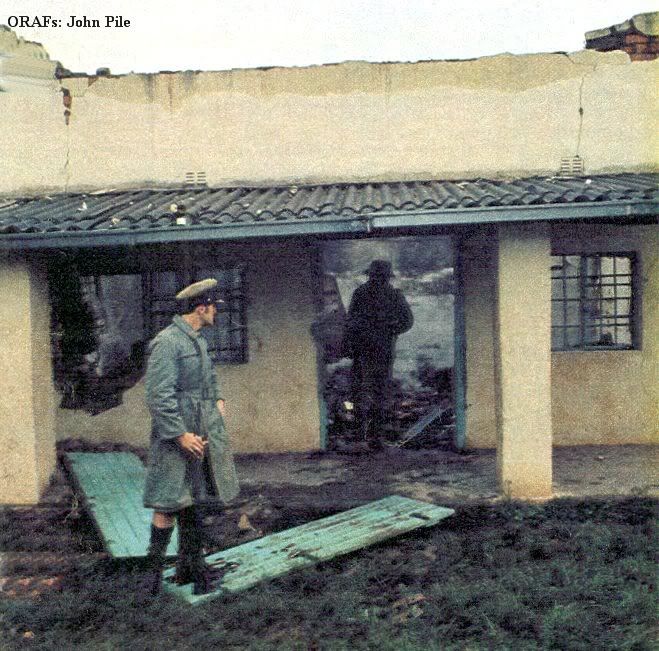
Security Force personnel examine the ruins of an African trading store rocketed by
terrorists in the mountain country south of Chipinga.
RHODESIA'S GUN-TOTING GIRLS
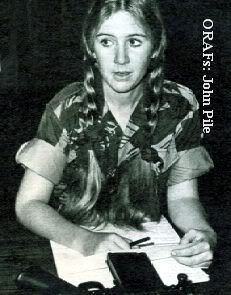
Bella Forsythe behind her desk in
Joint Operations Centre, Umtali.
The rifle in the foreground is hers,
and the knows how to put it to the
purpose for which it was built.
She wears pigtails and is barely 18 years old. On duty she wears camouflage denims and can handle a 9 mm pistol as well as the men under whom she serves.
Bella Forsythe, all of 18 years old and still sporting her schoolgirl pigtails, is not the sort of girl you would expect to find in camouflage fatigues. But Bella wears - and fills - her army uniform beautifully when she mans the guard post desk at Rhodesia's new Joint Operations Centre headquarters in Umtali in the Eastern Highlands.
Rarely without a smile, Bella, a former commercial artist, has learnt to deal as easily with brigadiers and other senior officers as with the tough-talking members of the small corps of military policemen. Her task is to process the inquiries of anyone entering the headquarters.
There are other women in uniform in the old hotel which has been taken over by Security Forces as the operational centre. Cary Odendaal (her sister serves at Army Headquarters in Salisbury) does duties at one of the radio listening posts. In its day this was one of the most elegant rooms in colonial Africa; now the rich velvet trappings have gone and been replaced by rows of prefabricated offices, each with a security classification prominently displayed on the door.
Upstairs, Gwen Archer, mother of three almost adult children and originally from Durban, does her thing in what was once a regal antechamber. Gwen, who came to the country when the Central African Federation was still a shining hope for this part of the continent, does not talk much about what she does except I that she fills an important role that would otherwise have kept a man out of the field.
WHY have these girls joined Rhodesia's Defence Force? One and all of them invariably answer something along the lines of their country needing them. And they mean it, for most times the conversation swings to the fact that every woman in uniform behind the lines releases a man for active military service.
Gwen Archer goes one step further. "I love this life. I wouldn't change it for anything. Even though the money is not the best and the hours are often hard and long I feel I'm achieving something. I'm a contributor to the society I'm living in," she says. , _ . ,
There are several hundred women of all ages serving in the Rhodesian Army and Air Force. Quite a few have requested to do operational duties with their men, either guarding establishments or doing routine work at the "sharp end." So far these requests have been refused, "mainly," said one senior officer, "because this is essentially a man's war. It has its brutal moments."
The Rhodesian Women s Services are deployed in a variety of tasks throughout the country.
The Rhodesian Women s Services are deployed in a variety of tasks throughout the country.
Apart from the Umtali contingent, females are employed on aerial photographic and reconnaissance work. Others pack parachutes. A few of the brighter ones are engaged in crypto offices coding and decoding the huge flow of messages which must emanate from a war this size. Still more work as ground staff and on movement control at any one of a dozen Rhodesian Air Force bases throughout the country.
These regular servicewomen are supplementary to almost 1 000 female civilian volunteers who contribute much of their time doing such duties as radio watches, manning operations rooms and driving military vehicles.
The Rhodesian Women's Services are very much a part of a modern and sophisticated army and their initial training is based largely on that provided for women recruits in the British Army.
The two-week course of basic training includes a fair deal of square bashing, pistol firing and weapon maintenance, military law and regulations, organisation and, for those who want it, accounting.
BELLA, Gwen, Cary and their colleagues represent a complete cross section of Rhodesian womanhood. Half of them are, or were, married. Some, like Mrs Anne Flatman-Brown, are recent immigrants, but most of them were bom south of the Zambesi; in Rhodesia or South Africa.
One of the recent volunteers is in a good position to make comparisons with other feminine military organisations elsewhere in the world. Pauline Triggol used to be a military policewoman in Singapore. Originally a native of Devon, Pauline and her husband came to Rhodesia a year ago; he serves part time with a police anti-terrorist unit.
Most or them are from average homes, and, like Caroline Odendaal, all have their tales to tell. Cary Odendaal joined the services immediately on returning from a three-month holiday in Europe. Initially she signed for a year, but on completion of her present contract, Cary hopes to for three more.
A third -generation Rhodesian Caroline left school and qualified as a State Enrolled Nurse. The radio and map work she does today at JOC Headquarters, Umtali, is a far cry from lifting bed pans and she is frank about the way she feels: "I like it. I liked the basic training and I like the routine and discipline."
According to Cary, the girls earn up to about R250 a month, with regular issues of free uniforms. The army also supplies regulation-issue handbags and shoes, which fit in well with the attractive uniform. In addition, the girls are eligible for free medical and dental care, and on completion of the contract period, they receive a gratuity "for services rendered."
"In a way, I suppose you could regard us girls as morale boosters in a man's world," Cary concluded.
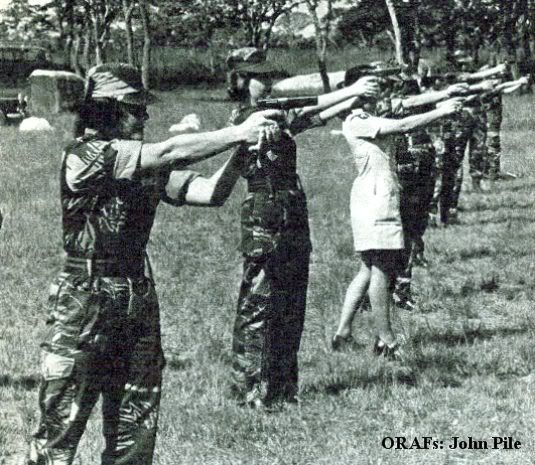
By the time the girls have finished their firearms training most of them just as good
with their weapons as the men who trained them.
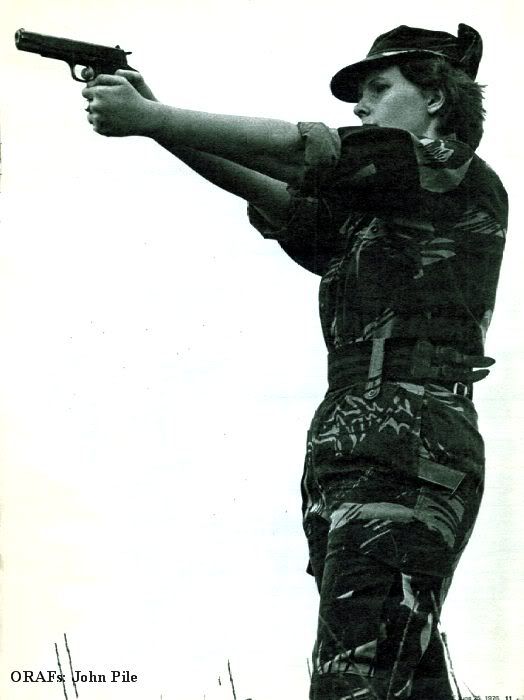
The 9mm pistol forms an important part of the girls uniforms.
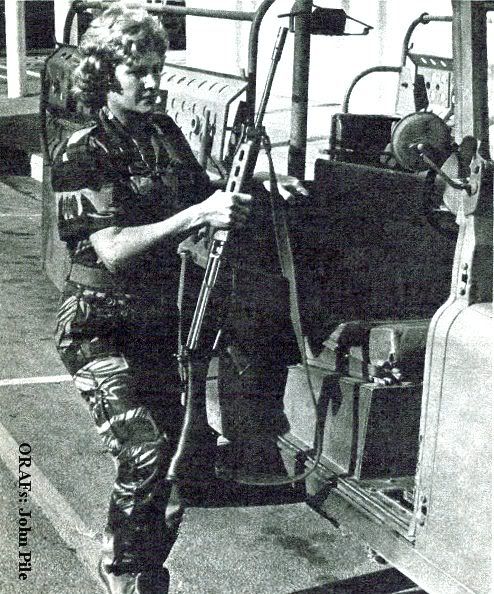
Gwen Archer of Rhodesia's Women's Services sets off on a convoy to the
Inyanga area.
TERRORISTS BLAST OPEN A NEW BATTLEGROUND IN THE
SOUTH EAST
A NEW FRONT IS OPENED UP
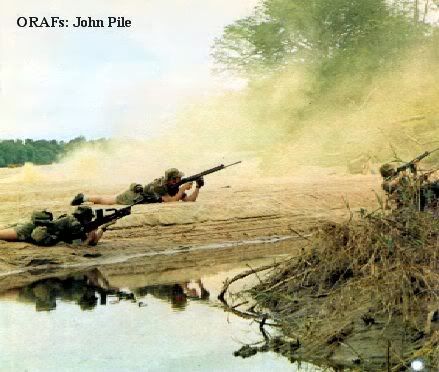
Rhodesian troops return fire during an engagement on the banks of
the Nuanetsi River.
Sabotage and hit-and-run attacks are tactics used by the latest band of killers to infiltrate Rhodesia. And even more ominous is the fact that some of the terrorists are women
THEY FIGHT IN AN AREA THE SIZE OF NATAL
It lies between the Nuanetsi and Limpopo Rivers only 40 kilometres from the northern Transvaal border.
The Standers had been away in Fort Victoria for the weekend. When their Land-Rover turned into the last dusty stretch of ochre farm road which leads to the house Ben immediately noticed that something was wrong. There was no spontaneous welcome greeting from the 'umfaan' (youngster) who normally opened the gate. The African compound behind the residence appeared deserted.
Ben feared the worst, more so because it would soon be dark.
Ushering his wife into the house, Ben sprinted for the telephone. It was dead. The line had been cut. "Get back into the Land-Rover," shouted Ben to his wife, at the same time grabbing his powerful hunting rifle.
With his foot flat on the accelerator, Ben roared off into the fast fading light. "Keep your head down," he urged his wife.
Only 200 metres down the narrow track the African dusk was shattered by automatic fire and Ben felt the impact as bullets ripped into the vehicle. An explosion shattered the rear window of the Land-Rover, showering them with particles of glass. A rocket, thought Ben. It had been fired short.
But the Standers' luck did not hold. As the firing continued behind them and the vehicle picked up speed a terrorist bullet blew one of the rear tyres. The Land-Rover lurched, skidded in the soft sand and almost overturned.
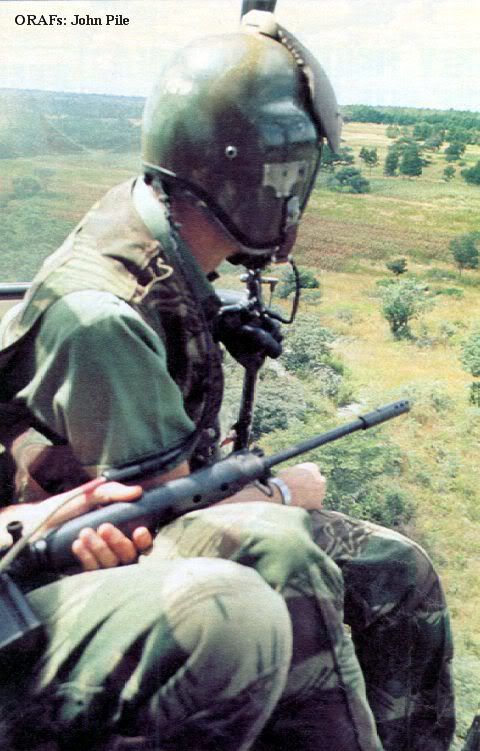
A helicopter patrol in the south-east, always on the look-out for tell tale signs
of the enemy.
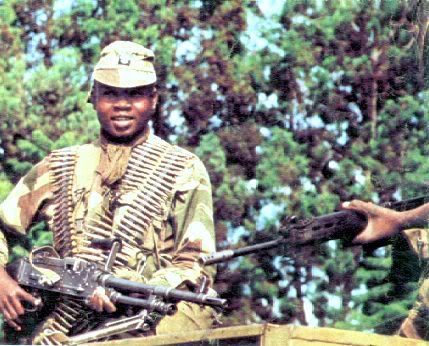
Two black Rhodesian soldiers on patrol near Umtali.
Ben tried to manoeuvre the vehicle through the thick sand and it seemed an eternity before they were able to gather a little speed again. Ben could feel that there was more wrong than a burst tyre for it was difficult to keep to the road; apparently a second tyre had gone.
For a few more minutes after they were out of the line of fire Ben Stander nursed the Land-Rover across the rough track. Then the vehicle spluttered and stopped. Hurriedly, Ben helped his wife, bleeding slightly from glass cuts, to the cover of some trees beside the road. His rifle at the ready, he waited for the terrorists to follow up their attack with another onslaught, for they must surely have heard the engine cut.
Ben and Marie waited an hour, then another. Nothing happened. Darkness had enveloped the scene and it seemed to Ben that he and his wife were alone against the world.
After a nightmare walk ot almost 20 kilometres to the next farm, they were finally able to summon help. Rhodesian Security Forces swiftly converged on the scene of the attack.
WHILE the attack on the Stander home in south-east Rhodesia is not unique - there were attacks and ambushes before the incursions and more are likely to follow - the onslaught does indicate the typical pattern
followed by the newest batch of insurgents who have infiltrated the region. Rarely are attacks made on open targets, but rather on people
and places where the risk of retaliation is minimal.
Any form of contact with the security forces is avoided, even when being pursued. More often than not, when the insurgents know that Rhodesian Army units are close by they split up and disappear into the thick bush country of the south-east to regroup at a predetermined spot a day or more later.
For this, and other reasons, security forces make few substantial "kills." But when prisoners are interrogated, the army gets a good idea how the terrorist groups operate.
"Operation Thrasher, code name for Rhodesia's newest area of operations (since last December) in the south-east of the country has added a new dimension to the war.
Not quite as intense as "Operation Hurricane" farther north, which has been on the go since December 1972, some of the difficulties faced by the security forces in this region are more acute, mainly because the terrorists make no secret of the fact that they can operate directly across the Mozambique frontier.
In the south-east there are no long supply routes across difficult terrain hampering logistics. Rather, terrorists can move directly across the frontier at will and lose themselves in the Tribal Trust Lands (TTLs), some of which border on South Africa.
Homelands such as Sangwe, Sengwe and Matibi are known to have harboured terrorists. Many Africans living in the Sengwe area are related to Africans living in the northern Transvaal and regularly cross the Limpopo to see their families. No doubt Marxist doctrines from Mozambique have already found their way into kraals on South Africa's northernmost border.
THE operational area falling under "Thrasher" is vast. It encompasses an area roughly the size of Natal, stretching in a long line from Nyamapanda in the north all the way southwards to the border with the Kruger National Park.
Part of this region embraces Manicaland and a small portion of Fort Victoria Province, although the terrorists have had little success in the latter area mainly because many of the recruits for the Rhodesian African Rifles traditionally come from here.
Nonetheless infiltration is taking place. Looking at the patterns to date, it is relevant that all arrows point in the direction of Beit Bridge and the Rutenga rail link with South Africa, one of Rhodesia's main arterial outlets to the world beyond. The High Command of the Zimbabwe Liberation Army has consistently argued that if they can cut one of Rhodesia's two remaining outlets to the sea - the other being through Botswana - it will be that much easier for the Organisation of African Unity to put pressure on Sir Seretse Khama to halt the flow of Rhodesian goods through his country.
The fact that many of the terrorists shot or captured in this zone have been carrying large quantities of high explosives in their packs is indicative of their prime motive sabotage.
Another factor which makes the new phase of warfare in the south-east different from that of the area around Mount Darwin is that external intelligence sources report that Frelimo is actively helping Rhodesia's terrorists. In many instances Frelimo has been providing assistance to the Zimbabwe African National Liberation Army - as the movement is now grandiloquently termed - in the transport of goods, provision of weapons and accommodation.
The terrorists usually infiltrate Rhodesia in groups of between five and 10. A few women have been encountered. On entering any area, the subversion of locals is their priority.
It is generally the local tribesmen and then families who are caught between the conflicting interests of two opposing forces. Those who are not immediately forthcoming in aid to gun-toting terrorists are invariably tortured and executed, some brutally.
On the other hand, should they be caught helping the enemy they are prosecuted by the Rhodesian authorities. Such is the nature of guerilla warfare, whether it be in south-east Asia or Africa. Either way, the unarmed civilian is the ultimate loser.
Some of the terrorists shot in actions around Chipinga, Chiredzi and places farther south are little more than schoolboys, having received rudimentary training in the fundamentals of unconventional warfare in Mozambique, a country not renowned for the prowess of its fighting men.
IN March this year, one party of disillusioned ZAPU terrorists defected all the way through the southern half of Rhodesia in Botswana. When they arrived in Francistown they handed over their weapons and claimed political asylum.
Another ZAPU dissident shot three of his ZANU colleagues and promptly handed himself over to the nearest security force patrol in April.
In spite of the problems, however, the latest batch of insurgents have notched up significant successes. Apart from sabotaging the Rutenga rail link with South Africa in April - and derailing a train - more active groups have mortared and rocketed a number of installations, including two pump houses.
Their mine-laying sorties are also resulting in at least two incidents a day in which civilian and security force personnel are injured.
While Rhodesia is considered among the world leaders in anti-landmine precautions, terrorist have lately taken to boosting the power of many of the mines they lay.
Meanwhile, to counter the movement of insurgents still further the
Rhodesian Government has imposed additional curfew restrictions. Instead of the usual dawn-to-dusk curfew, tribesmen are now forbidden to move their cattle or goats out of their kraals before nine in the morning.
And yet, in spite of the war and the daily incidents, life in most operational areas goes on as before. White farmers, while coming under
attack from time to time, continue planting their crops and going about their business.
It's the same in the north-east where the Centenary East Sporting Club and other social bodies are still as active as before. One soon gets used to the sight of young matrons and their husbands moving about with side-arms and rifles and hearing the occasional story about how they effectively used them.
There are reports of farmers being attacked, either on their farms or in ambushes. But there are very few cases of these brave pioneers getting killed.
THE MAN IN RHODESIA'S HOTTEST SEAT
Lieutenant-General Peter Walls is Commander of the Rhodesian Army. What are his plans to defeat terrorism?
Lieutenant General G.P. (Peter) Walls, OLM, MBE, Commander of the Rhodesian Army, started his professional military career with the British Army. But in 1941 numerous infantry officers, recently retired from the Indian Army, had to be absorbed into the British Army. New subalterns, such as Lt. Walls, were told they would have to make room for these "very
experienced officers."
So Peter Walls returned to Africa and joined the Southern Rhodesian Armv as a corporal.
Shortly after his Southern Rhodesian training period Peter Walls was posted to the Kings African Rifles in Bast Africa to help with the evacuation of Somaliland when it was handed over to Italy.
Then came Malaya and Lt. Walls was instructed to raise and train a unit which was to be attached to the Malayan Scouts (Special Air Services) Regiment, an elite fighting unit.
Peter Walls, by tnen a major, was awarded the British MBE for his two years in Malaya, but he says: "It was definitely in recognition of the entire squadron's efforts."
Today, General Peter Walls is at the forefront of Rhodesia's campaign against Communist-backed insurgency. He was only 46 when he was appointed army commander and many of the systems he improvised in other theatres of military activity have been applied by him to the Rhodesian campaign.
General Walls gave SCOPE this exclusive interview.
GENERAL WALLS, the anti insurgency war in Rhodesia been on the go in varying Intensity for the best part of a decade. Can you indicate how it differs from other guerilla wars, particularly Malaya?
I think the main difference is that the Malayan campaign was fought by the British in one of their overseas territories. In Rhodesia, this is our homeland. We've got no overseas troops fighting for us, we've got no help from overseas or from adjoining territories. These are Rhodesians fighting for Rhodesia.
In 1973 I believe, you started introducing the system of protected and consolidated villages. Was that originally a Malayan concept, and if so, why did it take so long to introduce in Rhodesia?
Well, we haven't slavishly followed the Malayan way of doing
things. We have tried to study methods from all over the world. This protected village scheme is really part of the civil administrative effort to defeat terrorism. The security forces did a lot to extol the advantages of the protected village scheme, and have helped push this idea along. What we were trying to do was separate the law-abiding citizens, who need protection and who wish to carry on a normal way of life, from the terrorists. Terrorists come and demand food and shelter, they ask for information about security forces, and where they don't get it easily they resort to brutal intimidation and torture. Every now and then they murder somebody to make it clear that they are going to demand help, and the very fact that they have to resort to intimidation and murder shows they are not getting help easily in the area where they have to carry out this practice.
Do you see any comparison here with the emergency in Kenya?
There are lessons to be learned from the Kenya campaign, but again it's a different set-up. We are dealing with the same sort of people, who think and operate the same way and with the same kind of Communist indoctrination. They live off the local population like parasites, intimidating them, and avoiding contact with security forces wherever possible. But again, this is Rhodesia, and Rhodesians of all races are looking after their homeland. This is where our kraals are, where our farms are. Kenya's Government policy came from London. Ours is right here.
Was the Mau Mau as good a fighter as your terrorists here; is there a similarity in training?
I don't believe you can compare terrorists in different parts of the world. You get well-trained terrorists and badly trained terrorists. You get the part-timers, the militia, the supporter, the cadres ... it is difficult to make a comparison, training methods are perhaps similar and perhaps the terrorists' weaponry is better than that of the Mau Mau in Kenya. But it's not as good as ours. As their weapons and ammunition have developed, so have ours. So we still have better weapons than the terrorists.
Because of developments else- where - guerilla wars being difficult to win — why do you think Rhodesians can win this one?
Well of course we don't acknowledge that this is a guerilla war. We say this is terrorism. You might as well say that in America in the days of the Mafia or in Prohibition days the forces of law and order couldn't succeed. They did succeed - and we're going to succeed because we are merely supporting law and order. I believe we have a tremendous fund of goodwill beneath the surface in this country.
The people are getting sick and tired of these terrorists who can't even decide among themselves who their leaders are, and what they are trying to achieve. There have been recent further examples of dissidence in the terrorist ranks and even between partners in crime, you might say. They've turned to fighting each other.
Can you give any examples of this fragmentation? Is it a similar thing to the Chitepo incident in Zambia?
The Chitepo incident is a good example of it. Take for example Bishop Muzorewa. He trundles around Africa looking for support in each capital he goes to, and trying to pose as the leader of the terrorists. I think it is pretty evident that he is not accepted by anybody, including, I would say,
possibly, the African presidents, as the leader of the terrorists operating in Rhodesia now.
Then there is Mr Nkomo who has been trying to negotiate with the government. He himself would concede that he doesn't command the support of everybody who is carrying out acts of terrorism in Rhodesia. Others like Ndabaningi Sithole, Chikerema, Mugabe, have also at some time or other claimed to be the real leader. I don't think any of those can be said to be the single leader. In fact, none of them has the support of all the terrorists in the field.
Is there one man who stands out as being leader of the Zimbabwe Liberation Army ?
No. There is no man who stands out - and there will be no man.
WHAT makes the Rhodesian Army a different anti-terrorist proposition to the Portuguese soldier, bearing in mind that Lisbon all but won the war in Angola and the troops in Guinea under Spinola were in some respects as efficient and dedicated as some of the Rhodesian units?
Some of the Portuguese soldiers were first-class soldiers, so I would never criticise them for their military qualities. But I think my previous statement covers this one. They were fighting a war in which they certainly didn't have their hearts. In many cases they just longed to get back home at the end of their tour. We are fighting for our homeland.
How much did you learn from the Vietnamese war? Just before the whole thing folded there they started to go in after the Vietcong at night. Is this your system here?
Yes. We operate as much by night as by day. We reckon that 24 hours of the day we've got to be in control of the situation, so there is no difference between day and night as far as our operations are concerned.
Are women as involved as they were in the Malaysia campaign ?
There are women running with the terrorists, but I would say that in many cases they are the locals who have suddenly thrown their lot in with them. I don't know how many come over with them.
Have any of them been killed in action?
Yes. I think so. I can't answer off- hand. I've never bothered about it.
To me a terrorist is a terrorist and I don't really bother much about it.
Do you see any foreign involvement in this war?
Well, there will be Communist sympathisers, or others, who are bound to offer their services. I should say that the Mozambique authorities would probably have to get people to help them with the working of the ports and all the other things that have gone to pot as the Portuguese stream away from them. At this particular time there doesn't appear to be any foreign involvement — other than some help which they are getting from
Tanzania.
WHAT about the Cubans? Do they pose any real threat to you?
Some Cubans may be helping with various things in Mozambique, but there's no particular threat to us at this stage and I don't foresee any particular problems. I've a very good reason to know that they were by no means semi-invincible in Angola. They were perhaps a little better than some of the MPLA troops they were working with, but not nearly as good as our soldiers, black or white.
What makes you think that tanks cannot be used in the Eastern Highlands, bearing in mind that Soviet tanks were taken in the mountainous areas of northern Angola and used to great effect in routing the FNLA?
I have never said tanks can't be operated against us in the Eastern Highlands. I've merely said that we're not worried about a tank threat. If they do operate in the Eastern Highlands against us, they will have a number of difficult factors to overcome. And all of these factors work in our favour. The normal logistics problems with tanks are pretty tremendous. The type of ground, the type of cover, the operating conditions generally would be more favourable to us than to the tanks.
What is the situation on the border at the moment? Just how far are Frelimo going to be able to continue with their shooting at Vila Salazar, shooting at aircraft, shooting at patrols.. . ? How much are you prepared to take from them?
For a long time we have indulged in hot pursuit where we have considered this to be in the interests of the people of Rhodesia. But our government's policy, and therefore that of the security forces, is that we would like to coexist with whoever is running Mozambique. In the old days it was the Portuguese, now it's Frelimo, one day it might be somebody else. But for the foreseeable future it's Frelimo and we'd like to live with them, we'd like to be friends with them; we have absolutely no aggressive intentions towards them. Therefore perhaps we've been putting up with a fair amount, to prove our good faith in this respect. And I believe that so long as it's our government's policy to get along with these chaps, we will put up with it as long as we can. Perhaps one day they would like to live along with us in peace and goodwill.
ITALICS
Recently you encouraged your chaps to prepare for urban guerilla warfare. In the mid-Sixties this was a big thing in this country. Is this likely to become a serious problem in the near future?
END ITALICS
As far back as I've been in the army we have trained and been prepared for urban disturbances, urban terrorism, and we are prepared for it now. We are ready for any eventuality.
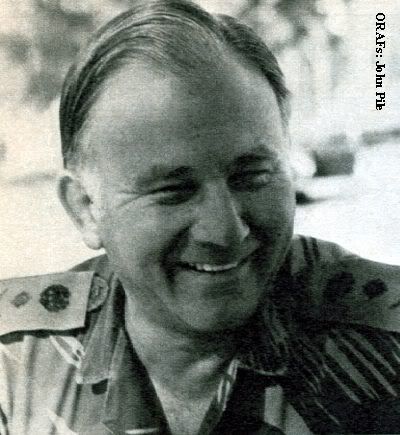
Lieutenant-General Peter Walls, Commander of
the Rhodesian Army.
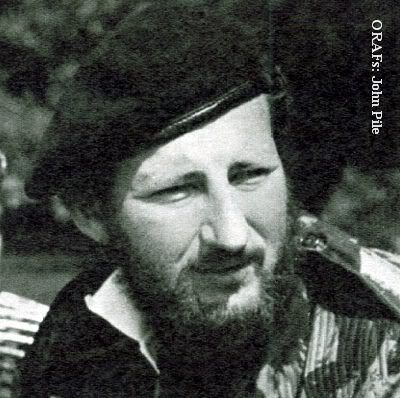
SCOPE'S Africa man, Al J. Venter, who compiled this
supplement and took all the photographs, was the first
journalist to have been allowed unrestricted
access to the Rhodesian war zone.
End of Supplement
THEY FIGHT IN AN AREA THE SIZE OF NATAL
BEN STANDER'S farm in the remote south-east corner of Rhodesia was rather appropriately named "Battlefield" by one of its former owners.
It lies between the Nuanetsi and Limpopo Rivers only 40 kilometres from the northern Transvaal border.
It was here, in early March, that one of the first groups of terrorists to infiltrate this lonely region from Mozambique prepared an ambush a few hundred metres from the Stander homestead and tried to kill Ben and his wife Marie.
The Standers had been away in Fort Victoria for the weekend. When their Land-Rover turned into the last dusty stretch of ochre farm road which leads to the house Ben immediately noticed that something was wrong. There was no spontaneous welcome greeting from the 'umfaan' (youngster) who normally opened the gate. The African compound behind the residence appeared deserted.
Ben feared the worst, more so because it would soon be dark.
Ushering his wife into the house, Ben sprinted for the telephone. It was dead. The line had been cut. "Get back into the Land-Rover," shouted Ben to his wife, at the same time grabbing his powerful hunting rifle.
With his foot flat on the accelerator, Ben roared off into the fast fading light. "Keep your head down," he urged his wife.
Only 200 metres down the narrow track the African dusk was shattered by automatic fire and Ben felt the impact as bullets ripped into the vehicle. An explosion shattered the rear window of the Land-Rover, showering them with particles of glass. A rocket, thought Ben. It had been fired short.
But the Standers' luck did not hold. As the firing continued behind them and the vehicle picked up speed a terrorist bullet blew one of the rear tyres. The Land-Rover lurched, skidded in the soft sand and almost overturned.

A helicopter patrol in the south-east, always on the look-out for tell tale signs
of the enemy.

Two black Rhodesian soldiers on patrol near Umtali.
Ben tried to manoeuvre the vehicle through the thick sand and it seemed an eternity before they were able to gather a little speed again. Ben could feel that there was more wrong than a burst tyre for it was difficult to keep to the road; apparently a second tyre had gone.
For a few more minutes after they were out of the line of fire Ben Stander nursed the Land-Rover across the rough track. Then the vehicle spluttered and stopped. Hurriedly, Ben helped his wife, bleeding slightly from glass cuts, to the cover of some trees beside the road. His rifle at the ready, he waited for the terrorists to follow up their attack with another onslaught, for they must surely have heard the engine cut.
Ben and Marie waited an hour, then another. Nothing happened. Darkness had enveloped the scene and it seemed to Ben that he and his wife were alone against the world.
After a nightmare walk ot almost 20 kilometres to the next farm, they were finally able to summon help. Rhodesian Security Forces swiftly converged on the scene of the attack.
WHILE the attack on the Stander home in south-east Rhodesia is not unique - there were attacks and ambushes before the incursions and more are likely to follow - the onslaught does indicate the typical pattern
followed by the newest batch of insurgents who have infiltrated the region. Rarely are attacks made on open targets, but rather on people
and places where the risk of retaliation is minimal.
Any form of contact with the security forces is avoided, even when being pursued. More often than not, when the insurgents know that Rhodesian Army units are close by they split up and disappear into the thick bush country of the south-east to regroup at a predetermined spot a day or more later.
For this, and other reasons, security forces make few substantial "kills." But when prisoners are interrogated, the army gets a good idea how the terrorist groups operate.
"Operation Thrasher, code name for Rhodesia's newest area of operations (since last December) in the south-east of the country has added a new dimension to the war.
Not quite as intense as "Operation Hurricane" farther north, which has been on the go since December 1972, some of the difficulties faced by the security forces in this region are more acute, mainly because the terrorists make no secret of the fact that they can operate directly across the Mozambique frontier.
In the south-east there are no long supply routes across difficult terrain hampering logistics. Rather, terrorists can move directly across the frontier at will and lose themselves in the Tribal Trust Lands (TTLs), some of which border on South Africa.
Homelands such as Sangwe, Sengwe and Matibi are known to have harboured terrorists. Many Africans living in the Sengwe area are related to Africans living in the northern Transvaal and regularly cross the Limpopo to see their families. No doubt Marxist doctrines from Mozambique have already found their way into kraals on South Africa's northernmost border.
THE operational area falling under "Thrasher" is vast. It encompasses an area roughly the size of Natal, stretching in a long line from Nyamapanda in the north all the way southwards to the border with the Kruger National Park.
Part of this region embraces Manicaland and a small portion of Fort Victoria Province, although the terrorists have had little success in the latter area mainly because many of the recruits for the Rhodesian African Rifles traditionally come from here.
Nonetheless infiltration is taking place. Looking at the patterns to date, it is relevant that all arrows point in the direction of Beit Bridge and the Rutenga rail link with South Africa, one of Rhodesia's main arterial outlets to the world beyond. The High Command of the Zimbabwe Liberation Army has consistently argued that if they can cut one of Rhodesia's two remaining outlets to the sea - the other being through Botswana - it will be that much easier for the Organisation of African Unity to put pressure on Sir Seretse Khama to halt the flow of Rhodesian goods through his country.
The fact that many of the terrorists shot or captured in this zone have been carrying large quantities of high explosives in their packs is indicative of their prime motive sabotage.
Another factor which makes the new phase of warfare in the south-east different from that of the area around Mount Darwin is that external intelligence sources report that Frelimo is actively helping Rhodesia's terrorists. In many instances Frelimo has been providing assistance to the Zimbabwe African National Liberation Army - as the movement is now grandiloquently termed - in the transport of goods, provision of weapons and accommodation.
The terrorists usually infiltrate Rhodesia in groups of between five and 10. A few women have been encountered. On entering any area, the subversion of locals is their priority.
It is generally the local tribesmen and then families who are caught between the conflicting interests of two opposing forces. Those who are not immediately forthcoming in aid to gun-toting terrorists are invariably tortured and executed, some brutally.
On the other hand, should they be caught helping the enemy they are prosecuted by the Rhodesian authorities. Such is the nature of guerilla warfare, whether it be in south-east Asia or Africa. Either way, the unarmed civilian is the ultimate loser.
Some of the terrorists shot in actions around Chipinga, Chiredzi and places farther south are little more than schoolboys, having received rudimentary training in the fundamentals of unconventional warfare in Mozambique, a country not renowned for the prowess of its fighting men.
IN March this year, one party of disillusioned ZAPU terrorists defected all the way through the southern half of Rhodesia in Botswana. When they arrived in Francistown they handed over their weapons and claimed political asylum.
Another ZAPU dissident shot three of his ZANU colleagues and promptly handed himself over to the nearest security force patrol in April.
In spite of the problems, however, the latest batch of insurgents have notched up significant successes. Apart from sabotaging the Rutenga rail link with South Africa in April - and derailing a train - more active groups have mortared and rocketed a number of installations, including two pump houses.
Their mine-laying sorties are also resulting in at least two incidents a day in which civilian and security force personnel are injured.
While Rhodesia is considered among the world leaders in anti-landmine precautions, terrorist have lately taken to boosting the power of many of the mines they lay.
Meanwhile, to counter the movement of insurgents still further the
Rhodesian Government has imposed additional curfew restrictions. Instead of the usual dawn-to-dusk curfew, tribesmen are now forbidden to move their cattle or goats out of their kraals before nine in the morning.
And yet, in spite of the war and the daily incidents, life in most operational areas goes on as before. White farmers, while coming under
attack from time to time, continue planting their crops and going about their business.
It's the same in the north-east where the Centenary East Sporting Club and other social bodies are still as active as before. One soon gets used to the sight of young matrons and their husbands moving about with side-arms and rifles and hearing the occasional story about how they effectively used them.
There are reports of farmers being attacked, either on their farms or in ambushes. But there are very few cases of these brave pioneers getting killed.
THE MAN IN RHODESIA'S HOTTEST SEAT
Lieutenant-General Peter Walls is Commander of the Rhodesian Army. What are his plans to defeat terrorism?
Lieutenant General G.P. (Peter) Walls, OLM, MBE, Commander of the Rhodesian Army, started his professional military career with the British Army. But in 1941 numerous infantry officers, recently retired from the Indian Army, had to be absorbed into the British Army. New subalterns, such as Lt. Walls, were told they would have to make room for these "very
experienced officers."
So Peter Walls returned to Africa and joined the Southern Rhodesian Armv as a corporal.
Shortly after his Southern Rhodesian training period Peter Walls was posted to the Kings African Rifles in Bast Africa to help with the evacuation of Somaliland when it was handed over to Italy.
Then came Malaya and Lt. Walls was instructed to raise and train a unit which was to be attached to the Malayan Scouts (Special Air Services) Regiment, an elite fighting unit.
Peter Walls, by tnen a major, was awarded the British MBE for his two years in Malaya, but he says: "It was definitely in recognition of the entire squadron's efforts."
Today, General Peter Walls is at the forefront of Rhodesia's campaign against Communist-backed insurgency. He was only 46 when he was appointed army commander and many of the systems he improvised in other theatres of military activity have been applied by him to the Rhodesian campaign.
General Walls gave SCOPE this exclusive interview.
GENERAL WALLS, the anti insurgency war in Rhodesia been on the go in varying Intensity for the best part of a decade. Can you indicate how it differs from other guerilla wars, particularly Malaya?
I think the main difference is that the Malayan campaign was fought by the British in one of their overseas territories. In Rhodesia, this is our homeland. We've got no overseas troops fighting for us, we've got no help from overseas or from adjoining territories. These are Rhodesians fighting for Rhodesia.
In 1973 I believe, you started introducing the system of protected and consolidated villages. Was that originally a Malayan concept, and if so, why did it take so long to introduce in Rhodesia?
Well, we haven't slavishly followed the Malayan way of doing
things. We have tried to study methods from all over the world. This protected village scheme is really part of the civil administrative effort to defeat terrorism. The security forces did a lot to extol the advantages of the protected village scheme, and have helped push this idea along. What we were trying to do was separate the law-abiding citizens, who need protection and who wish to carry on a normal way of life, from the terrorists. Terrorists come and demand food and shelter, they ask for information about security forces, and where they don't get it easily they resort to brutal intimidation and torture. Every now and then they murder somebody to make it clear that they are going to demand help, and the very fact that they have to resort to intimidation and murder shows they are not getting help easily in the area where they have to carry out this practice.
Do you see any comparison here with the emergency in Kenya?
There are lessons to be learned from the Kenya campaign, but again it's a different set-up. We are dealing with the same sort of people, who think and operate the same way and with the same kind of Communist indoctrination. They live off the local population like parasites, intimidating them, and avoiding contact with security forces wherever possible. But again, this is Rhodesia, and Rhodesians of all races are looking after their homeland. This is where our kraals are, where our farms are. Kenya's Government policy came from London. Ours is right here.
Was the Mau Mau as good a fighter as your terrorists here; is there a similarity in training?
I don't believe you can compare terrorists in different parts of the world. You get well-trained terrorists and badly trained terrorists. You get the part-timers, the militia, the supporter, the cadres ... it is difficult to make a comparison, training methods are perhaps similar and perhaps the terrorists' weaponry is better than that of the Mau Mau in Kenya. But it's not as good as ours. As their weapons and ammunition have developed, so have ours. So we still have better weapons than the terrorists.
Because of developments else- where - guerilla wars being difficult to win — why do you think Rhodesians can win this one?
Well of course we don't acknowledge that this is a guerilla war. We say this is terrorism. You might as well say that in America in the days of the Mafia or in Prohibition days the forces of law and order couldn't succeed. They did succeed - and we're going to succeed because we are merely supporting law and order. I believe we have a tremendous fund of goodwill beneath the surface in this country.
The people are getting sick and tired of these terrorists who can't even decide among themselves who their leaders are, and what they are trying to achieve. There have been recent further examples of dissidence in the terrorist ranks and even between partners in crime, you might say. They've turned to fighting each other.
Can you give any examples of this fragmentation? Is it a similar thing to the Chitepo incident in Zambia?
The Chitepo incident is a good example of it. Take for example Bishop Muzorewa. He trundles around Africa looking for support in each capital he goes to, and trying to pose as the leader of the terrorists. I think it is pretty evident that he is not accepted by anybody, including, I would say,
possibly, the African presidents, as the leader of the terrorists operating in Rhodesia now.
Then there is Mr Nkomo who has been trying to negotiate with the government. He himself would concede that he doesn't command the support of everybody who is carrying out acts of terrorism in Rhodesia. Others like Ndabaningi Sithole, Chikerema, Mugabe, have also at some time or other claimed to be the real leader. I don't think any of those can be said to be the single leader. In fact, none of them has the support of all the terrorists in the field.
Is there one man who stands out as being leader of the Zimbabwe Liberation Army ?
No. There is no man who stands out - and there will be no man.
WHAT makes the Rhodesian Army a different anti-terrorist proposition to the Portuguese soldier, bearing in mind that Lisbon all but won the war in Angola and the troops in Guinea under Spinola were in some respects as efficient and dedicated as some of the Rhodesian units?
Some of the Portuguese soldiers were first-class soldiers, so I would never criticise them for their military qualities. But I think my previous statement covers this one. They were fighting a war in which they certainly didn't have their hearts. In many cases they just longed to get back home at the end of their tour. We are fighting for our homeland.
How much did you learn from the Vietnamese war? Just before the whole thing folded there they started to go in after the Vietcong at night. Is this your system here?
Yes. We operate as much by night as by day. We reckon that 24 hours of the day we've got to be in control of the situation, so there is no difference between day and night as far as our operations are concerned.
Are women as involved as they were in the Malaysia campaign ?
There are women running with the terrorists, but I would say that in many cases they are the locals who have suddenly thrown their lot in with them. I don't know how many come over with them.
Have any of them been killed in action?
Yes. I think so. I can't answer off- hand. I've never bothered about it.
To me a terrorist is a terrorist and I don't really bother much about it.
Do you see any foreign involvement in this war?
Well, there will be Communist sympathisers, or others, who are bound to offer their services. I should say that the Mozambique authorities would probably have to get people to help them with the working of the ports and all the other things that have gone to pot as the Portuguese stream away from them. At this particular time there doesn't appear to be any foreign involvement — other than some help which they are getting from
Tanzania.
WHAT about the Cubans? Do they pose any real threat to you?
Some Cubans may be helping with various things in Mozambique, but there's no particular threat to us at this stage and I don't foresee any particular problems. I've a very good reason to know that they were by no means semi-invincible in Angola. They were perhaps a little better than some of the MPLA troops they were working with, but not nearly as good as our soldiers, black or white.
What makes you think that tanks cannot be used in the Eastern Highlands, bearing in mind that Soviet tanks were taken in the mountainous areas of northern Angola and used to great effect in routing the FNLA?
I have never said tanks can't be operated against us in the Eastern Highlands. I've merely said that we're not worried about a tank threat. If they do operate in the Eastern Highlands against us, they will have a number of difficult factors to overcome. And all of these factors work in our favour. The normal logistics problems with tanks are pretty tremendous. The type of ground, the type of cover, the operating conditions generally would be more favourable to us than to the tanks.
What is the situation on the border at the moment? Just how far are Frelimo going to be able to continue with their shooting at Vila Salazar, shooting at aircraft, shooting at patrols.. . ? How much are you prepared to take from them?
For a long time we have indulged in hot pursuit where we have considered this to be in the interests of the people of Rhodesia. But our government's policy, and therefore that of the security forces, is that we would like to coexist with whoever is running Mozambique. In the old days it was the Portuguese, now it's Frelimo, one day it might be somebody else. But for the foreseeable future it's Frelimo and we'd like to live with them, we'd like to be friends with them; we have absolutely no aggressive intentions towards them. Therefore perhaps we've been putting up with a fair amount, to prove our good faith in this respect. And I believe that so long as it's our government's policy to get along with these chaps, we will put up with it as long as we can. Perhaps one day they would like to live along with us in peace and goodwill.
ITALICS
Recently you encouraged your chaps to prepare for urban guerilla warfare. In the mid-Sixties this was a big thing in this country. Is this likely to become a serious problem in the near future?
END ITALICS
As far back as I've been in the army we have trained and been prepared for urban disturbances, urban terrorism, and we are prepared for it now. We are ready for any eventuality.

Lieutenant-General Peter Walls, Commander of
the Rhodesian Army.

SCOPE'S Africa man, Al J. Venter, who compiled this
supplement and took all the photographs, was the first
journalist to have been allowed unrestricted
access to the Rhodesian war zone.
End of Supplement
Recompiled, by Eddy Norris, from scanned copies of the supplement to the Scope magazine which was made available by Major John Pile of 4 Rhodesia Regiment. Thanks John
Special thanks to Mr. Al J. Venter for his approval to use his work on a one time basis only.
Thanks to Hugh Bomford for the eMail details of Al Venter.
The recompilation was done for no or intended financial gain but rather to record the memories of Rhodesia.
Thanks to
Paul Norris for the ISP sponsorship.
Paul Mroz for the image hosting sponsorship.
Robb Ellis for his assistance.
Should you wish to contact Eddy Norris please mail me on orafs11@gmail.com
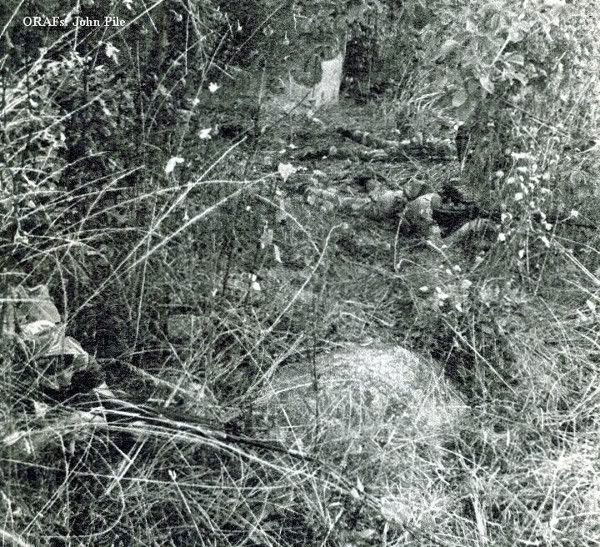
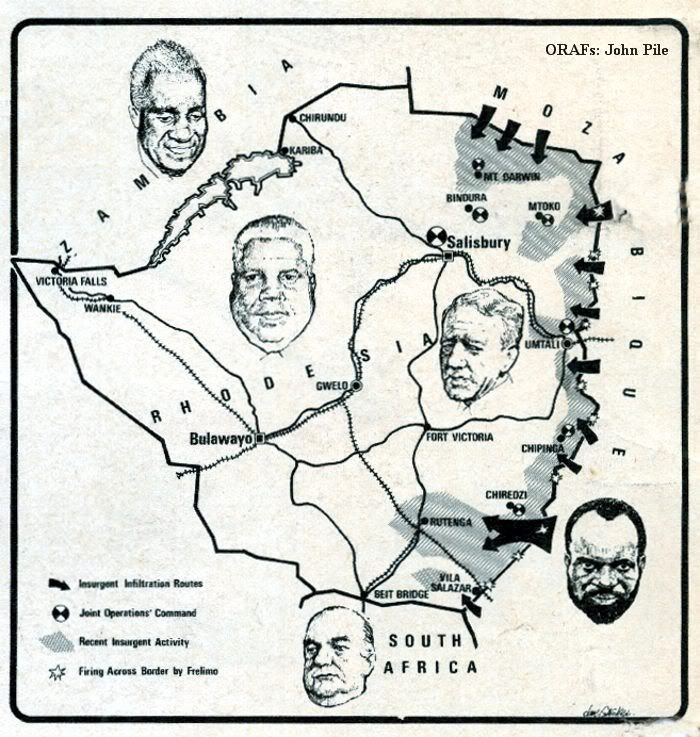
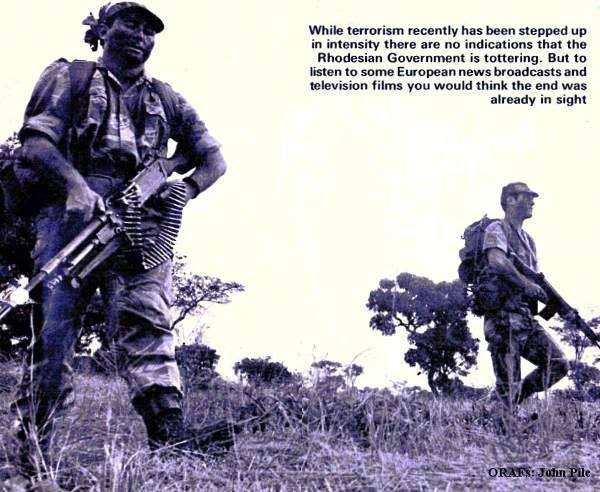
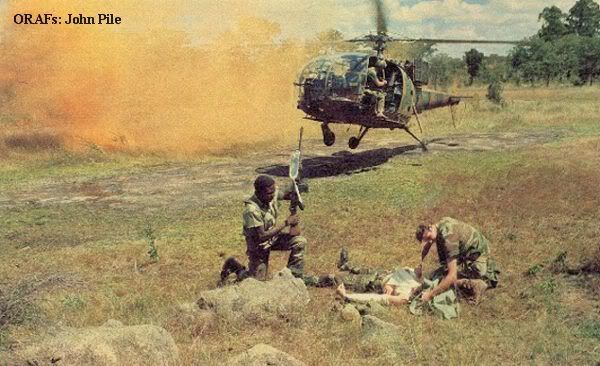
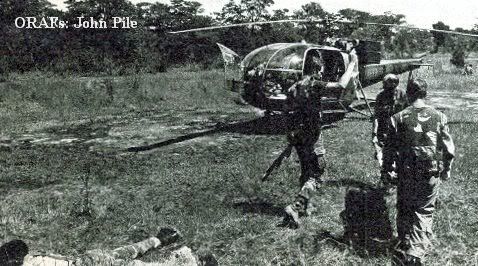
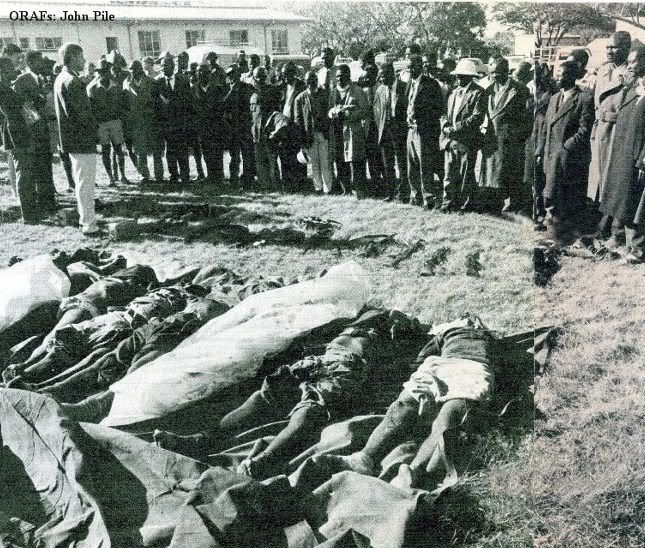
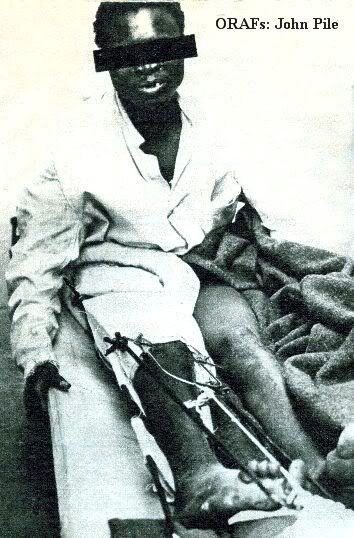
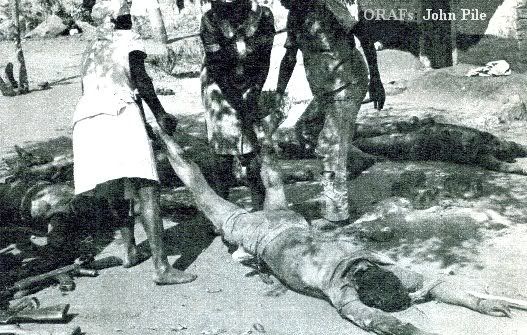
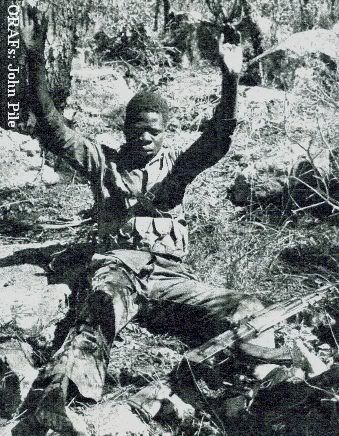
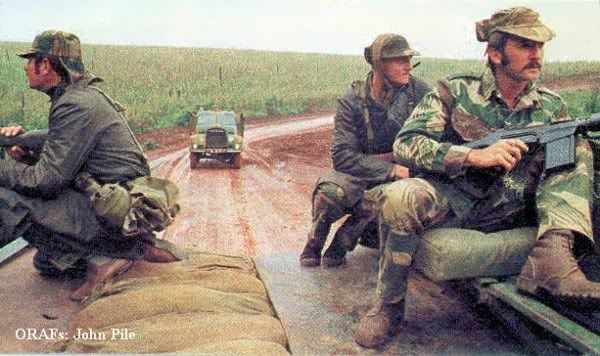
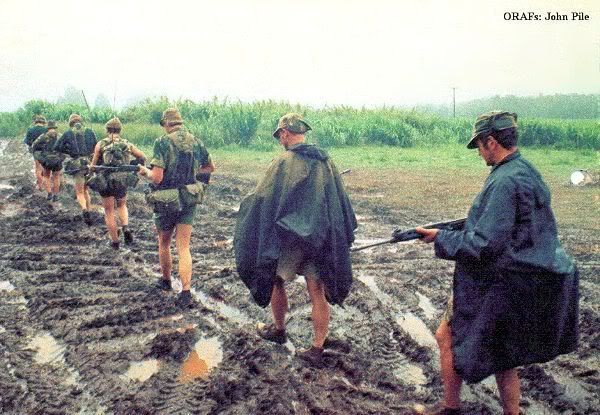
Rex Taylor (RhAF) Writes:-
ReplyDeleteThe site of the photo was an opening in the Msasa bush near PE dam. The same site was frequently used for photo shoots of deplaning troops. There is an oft reprinted one of an envelopment exercise in the same clearing! I believe that the selection of the site was due to John Barnes and Murray Hofmeyr. In the 1990’s I used to drive along the new tarmac road that led from Chitungiswa/ PE dam road to Marondera. This site and several others we used to use for training, hovering patterns, tight circuits, auto rotations and low flying were now devoid of tree cover! Sad!
I am sure the picture has been printed in reverse, - surely this is the port side of the aircraft? Midway down the fuselage is an oblong object, I’m sure its not part of the aircraft!
Nick Baalbergen (Intaf) Writes:-
ReplyDeleteI had forgotten about the coverage of our security situation in 'Scope'. Material well worth recording on the site.
Between 1972 and the end of 1977 (with a year 'off' for my national sevice), I was posted from the north in Inyanga, to the south in Chipinga, so I experienced the change from a relatively carefree lifestyle, to a lifestyle adapted to an insidious war.
Thank you so much for this article. It help explains further what my friends have been telling me about as I learn more, little by little, about Rhodesia. Thank you!
ReplyDeleteThis is an incredible blog. Thank you for putting it together.
ReplyDeleteLouis Hartley Writes:-
ReplyDeleteA great piece of History ...our kids should read this ...our heritage which vanished / destroyed by Mugabe !